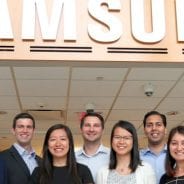Join the MetroMBA community by registering and receive resources such as admissions deadlines, scholarship information and how to finance your MBA.
Search results for :
Part-Time MBA
Desautels Faculty of Management Part-Time MBA Program Structure
Students in the 57-credit, 32-month McGill University Desautels Faculty of Management Professional part-time MBA program typically attend around six hours of evening classes each week. Unlike many comparative MBA programs, the Desautels Professional part-time MBA program typically leaves the months of July and August free of classes. However, in year one and year two of the program, students must complete a one-week session in the early summer. Professional workshops are held on Fridays once or twice per month.
Curriculum
Like the full-time MBA at Desautels, the Professional part-time MBA begins with the mandatory Base Camp in early August, which helps students get back up to speed before continuing their education. Then, from September through April of the first year, students complete the “integrated” core curriculum, which features five separate modules.
After the core courses are complete, Professional part-time MBA students complete ten cross-disciplinary courses over the course of two years. These courses feature the following subjects: strategy; finance; accounting; marketing; operations management; information systems; and organizational behavior. These courses typically coincide with the selected concentrations of the students.
The second year of the program also features an international study trip.
Career Statistics
The majority of McGill Desautels Professional part-time MBA students work in the finance industry at 45 percent, followed by consulting/entrepreneurship at 25 percent, and marketing/sales at 15 percent.
Tuition, Scholarships, and Financial Aid
Per year, the estimated tuition of the McGill Desautels Professional part-time MBA program is $26,500 CAD. Over the entire program, paid in six installments, tuition is $79,500.
Canadian residents are eligible for federal and private loans. However, international applicants may have to fund their education through private loans only. There are several scholarship opportunities in the program, which can be found here.
Admissions
In order to apply to the McGill Desautels Professional part-time MBA program, applicants must submit:
• A completed application
• Official transcripts
• Two letters of reference
• GMAT/GRE scores
• Proof of English proficiency (TOEFL or IELTS scores) if necessary
At least two years of previous work experience is required in order to apply. Strong candidates may be invited to interview with the Desautels admissions team. International students may conduct interviews digitally via Skype, while local students will be invited on campus.
Application deadlines are as follows:
Applications for Fall 2022
1 November 2021
15 January 2022
15 March 2022[final deadline for international students (Please note applications must be completed)]
1 May 2022[final deadline for Canadian Citizens and Permanent Residents (Please note applications must be completed)]
→ Apply now (Applications for Fall 2022 open at the end of September)
Full-Time MBA
Desautels Faculty of Management Full-Time MBA Program Structure
McGill University provides a one-year and two-year full-time MBA option. The one-year MBA program is a 48-credit program, while the two-year MBA program is a 54-credit program. Every student begins each program at the same time and takes the same number of classes. The difference in credits comes down to the time you spend in the internship, not the classroom. The 48-credit program can be completed in 12 months. The 54-credit takes 20, though many students accelerate it to finish in 16.
The one-year MBA program consists of taking core courses in the fall. Students additionally complete electives in the winter and summer. The two-year MBA consists of students taking core courses in the fall, electives in the winter, an internship in the summer, electives in the fall, and electives in the winter. However, this is just an example of the typical student journey; the two-year MBA internship can be completed any time after you complete your core courses.
Curriculum
The McGill University Desautels Faculty of Management full-time MBA begins with an intensive one-week “Base Camp” in early August, designed specifically to bring incoming students up to speed on business math and financial accounting. The curriculum also includes a 10-day international study trip to improve your global fluency through company visits and networking events in a foreign context. There is also an opportunity to gain a new perspective by studying at another top business school overseas. The internship, which can be completed after your core courses, builds practical work experience to expand your network and real-life experience.
At the beginning of the program, students will experience five modules and a case competition. Then, during the second semester, elective coursework will begin. Students can choose from one of five concentrations: finance, marketing, or global leadership, for instance.
Full-Time MBA Rankings
- Bloomberg (Canada): 7th
- Financial Times: 91 (2nd overall in Canada)
McGill Full-Time Class Profile
A typical cohort in the McGill University Desautels Faculty of Management MBA class features between 65-85 students, featuring 31 percent female students. MBAs at Desautels are usually 29-years old and have five and a half years of previous work experience. Furthermore, over 21 countries are represented by the current student body. On average, the GMAT score for Full-Time students at the McGill MBA is 675.
Career Statistics
An estimated 85 percent of Desautels full-time MBA graduates earn an employment offer within three months of receiving a degree. The average base salary of full-time MBA grads is $87,661CAD, with an average signing bonus of $10,857. The McGill full-time MBA students also receive career resources such as career advisors and coaches, stream advisors, the Desautels Mentoring Program, and professional development training.
Tuition, Scholarships, and Financial Aid
The current annual tuition of the McGill Desautels full-time MBA program is $82,500 CAD for Canada residents, and $99,500 for international residents. In addition to the tuition cost, the McGill full-time MBA has additional expenses, which include:
McGill Desautels Full-Time MBA Costs (CAD)
| Canada Resident | International Resident | |
| Incidental Fees | $2,000 | $2,000 |
| PGSS Health & Dental Insurance (single coverage) | $502 | $1,400 |
| Books and Supplies | $2,000 | $2,000 |
| Accommodations (Rent & Food) | $13,800 | $13,800 |
| Transportation | $1,020 | $1,020 |
| Personal Expenses | $1,500 | $1,500 |
| Total Expenses | $20,822 | $21,720 |
All students in the McGill Desautelts full-time MBA program are automatically considered for merit-based scholarships. Find additional information here.
Canadian residents are eligible for federal and private loans. However, international applicants may have to fund their education through private loans only.
Admissions
In order to apply to the McGill Desautels full-time MBA program, applicants must submit:
- A completed application
- Official transcripts
- Two letters of reference
- GMAT/GRE scores
- Proof of English proficiency (TOEFL or IELTS scores) if necessary
- Interview (by invitation)
- Three essay questions
- Why do you intend on pursuing an MBA at this point in your life? Describe your mid-term and long-term visions for your post-MBA career path and how will the Desautels MBA program add value to your future career?
- What qualities would you look for in an MBA classmate when working on a team project and describe how your background and leadership skills will enhance the experience of others?
- Describe a difficult decision you made and the process that you went through to make it.
At least two years of previous work experience is required in order to apply. Strong candidates may be invited to interview with the Desautels admissions team. International students may conduct interviews digitally via Skype, while local students will be invited on campus.
2022 Application Deadlines for the McGill Full-Time MBA
Applications for Fall 2022
1 November 2021
15 January 2022
15 March 2022 [final deadline for international students (Please note applications must be completed)]
1 May 2022 [final deadline for Canadian Citizens and Permanent Residents (Please note applications must be completed)]
FAQs
- How has the university coped with the pandemic? Classes are primarily online to keep students and staff safe.
- What graduate programs are offered at the school? Students may achieve their MM, MBA, and EMBA at Desautels Faculty of Management.
- Where did most graduates find work? Thirty-one percent of the class of 2019 gained work in the finance industry while 20% took work in accounting, 16% began work in consulting and the rest took a variety of positions in industries ranging from technology to marketing.
Program Search Tool
Program Cost: $82,500 CAD for Canada residents, and $99,500 for international residents
Total Length in Months: 12-16
Avg. GMAT Score: 675
Classes: select all that apply:
- Online
- Hybrid
- On-site
McGill Full-Time MBA Stats
| Average Age | 29 |
| Credits | 48-54 |
| Female Student Body | 31% |
| GMAT Score | 675 |
| Length of Program | 12-16 Months |
| Post-Grad Average Salary | $87,661 CAD |
| Tuition (Canadian Resident) | $82,500 CAD |
| Tuition (International Resident) | $99,500 CAD |
| Work Experience Average | 5.5 Years |
Columbia Professor Offers Advice on #MeToo Fallout for Female Leadership
The #MeToo movement has been a good thing, bringing to light many gender issues regarding sexual harassment and assault. And, it’s been particularly valuable for women in the workplace.
Unfortunately, while most of the response to the #MeToo movement has been positive, it has triggered a few unexpected negative consequences. As a Forbes article recently explains, there’s a “potential threat to women’s advancement to senior leadership, as some men have become wary of forging professional relationships with female colleagues.”
Men Are Worried About Harassment
Since the #MeToo falloout, 82 percent of men have admitted to being worried about false claims of harassment—more than any other gender issue in the workplace. Worse still, that fear has resulted in half of all male managers feeling uncomfortable mentoring, socializing, and working alone with women, revealed a LeanIn survey. Now, senior men are three times more likely to hesitate to ask a junior-level woman to a work dinner than a junior-level man.
Fixing the Problem
Unfortunately, these negative responses to #MeToo could slow the progress for female leadership, which is precisely the opposite reaction that the movement promoted. It’s also bad for organizations, as research shows that female executives increase profitability.
So, what can organizations do to ensure these adverse reactions to #MeToo don’t stop women from climbing the ladder? Here are three things that Columbia University professor Jason Wingard tells Forbes companies could do.
1. Improve Workplace Flexibility
According to Pew research, over half of millennial mothers (58 percent) admit that being a parent makes it harder to get ahead at work. Only 19 percent of fathers feel that way.
If you want more women in leadership, you have to improve workplace flexibility to accommodate families better. When there are stronger policies in place that allow women to meet the demands of the office and home, then more women will remain in the workforce. This includes offering extended maternity leave, childcare options, and flexible working arrangements.
2. Develop Sponsorship Programs
Your company can also help advance women in leadership by formalizing relationships between male leaders and female subordinates via sponsorships. Compared to mentorships, sponsorships are more official and advocated by senior leaders, which can remove some of the fear.
Best yet, sponsors are typically more satisfied in their career and women being sponsored are 68 percent satisfied with their career advancement. Furthermore, 85 percent of mothers with sponsors are more likely to continue working full time compared to just 58 percent without.
3. Make Clear Company Policies
Since #MeToo, 55 percent of American men feel that it’s more difficult to know how to interact with women at work. Companies that create more clarity in the workplace with clearly defined sexual harassment policies can help alleviate this concern. Organizations should also clearly define company policies regarding romantic relationships in the workplace.
No matter what your company decides to do in response to #MeToo, the key thing to remember is that action must be taken now. You cannot wait and allow negative reactions to the movement to harm women’s ability to reach leadership positions at your organization.
This article has been edited and republished with permissions from its original source, Clear Admit.
Associate Director of MBA Recruitment at Oxford Saïd Answers 5 Questions
In our latest installment of the MetroMBA “5 Questions” series, we speak with Mariel Kessel, the Associate Director of MBA Recruitment at the University of Oxford Saïd Business School. Kessel talks about the role of research at the school, introduces a new professor of finance and Global Opportunities and Threats module, and offers advice for prospective MBA candidates.
1. What opportunities outside of the classroom does Oxford Saïd offer MBA students?
“In addition to our core courses and extensive elective offerings, MBA students have the opportunity to further their learning through a variety of co-curricular and extra-curricular options, including the Oxford Saïd Finance Lab, Social Impact Lab, or Seed Fund—a student-led initiative that allows MBA candidates to gain first-hand investment experience.
International electives will see students learn in real-world scenarios in the U.S. or Africa, and the entrepreneurship and social impact opportunities offered by the Skoll Foundation, Oxford Foundry, and Entrepreneurship Centre are limitless. Outside of the business school, students will be part of the wider University of Oxford community and can meet fellow students from a great variety of disciplines and backgrounds.”
2. In what ways does research play an integral role in the Saïd MBA program?
“A great example of research playing an integral role in the Oxford Saïd MBA program is through an online workshop for women leaders called ‘Owning your career,’ which takes place during the school’s activities around International Women’s Day this year. The module draws on research findings from interviews with female CEOs, undertaken as part of Oxford’s CEO Research Project and focuses on one of the three themes identified in the article based on that research: self-acceptance, self-development, and self-management.”
3. Are there any new programs, initiatives, faculty, or events that you can share with us?

Mariel Kessel, Associate Director of MBA Recruitment
“We are very excited to have Renee Adams join us as a Professor of Finance. Her work highlights organizational design problems to which seemingly inefficient governance mechanisms are the solution. Her research also highlights the role selection plays in understanding corporate leaders.
Our Global Opportunities and Threats: Oxford (GOTO) module focuses on the future of energy this year and is designed to create a collaborative community that can tackle world-scale problems. Each year, students are tasked with a different problem to solve and assigned tutors from across the broader university who aid and assess their work. The module culminates in a summit, at which select groups present their findings to a panel of leaders from both industry and academia.”
4. What is one piece of advice you would give to a prospective MBA student?
“My best advice is to find the school and program that feels like the right fit for you. It’s a once in a lifetime opportunity (and commitment) so don’t get caught up on one aspect (i.e., fee, rankings, one specific elective). Instead, talk to alumni, staff, current students, visit if that’s an available option for you and, finally, go with your gut and you will end up at the right school for you and your career goals.”
5. What’s a great nearby restaurant or location for networking?
“We have a fantastic common room, gardens, and canteen at Oxford Saïd, so students don’t need to travel far to find great locations to socialize and network. However, Oxford is of course blessed with a fantastic variety of restaurants and pubs, including the historic Turf Tavern, which first opened in 1381 and counts CS Lewis and Stephen Hawking among its former clientele.”
About the Oxford Saïd Business School
The University of Oxford Saïd Business School blends the new and the old. The business school was founded in 1996, but the University dates back 1,000 years and is regarded as the oldest English-speaking university. This creates a unique dynamic at the school where tradition meets innovation. On the school website, they state, “We create programmes and ideas that have global impact. We educate people for successful business careers, and as a community seek to tackle world-scale problems.” They do this through delivering cutting edge programs including a One Year MBA, Executive MBA, 1+1 Program, Masters in Financial Economics, Masters in Law and Finance, and a Masters in Major Program Management.
“A transformative experience. Saïd Business School reframed my mindset and gave me an invaluable network.” —Nadine El Sharif, MBA student
Learn more about the University of Oxford Saïd Business School by visiting the school website.
Top MBA Recruiters: Deutsche Bank
Deutsche Bank, the 15th-largest bank in the world, oversees $1.6 trillion in total assets, operates offices in 58 countries, and employs more than 91,000 employees. And, of course, that means a lot of Deutsche Bank career opportunities for MBA students and graduates.
Given its stellar reputation for international investment and strong position in the global financial market, Deutsche Bank has long been a desirable destination for MBA graduates. Although Deutsche Bank has not always been in the news for the most honorable reasons, right now is actually an excellent time for MBAs to join the company.
The 5 Best DC Part-Time MBA Programs
The necessity of continuing to work while pursuing an MBA is a reality for many students. Part-time programs, built to fit into work and family schedules, are an increasingly sought after format for the MBA. The DMV metro area is home to some of the top part-time MBAs in the country. Here is a look at five of the best Washington DC part-time MBA programs.

Virginia Tech’s Pamplin School of Business’ evening part-time program recently jumped three places to 14th in U.S. News and World Report‘s rankings. Also ranked as the top public university part-time degree, the evening program at Pamplin begins in spring or fall, and can take anywhere from two-to-five years to complete, with the average student receiving an MBA in 3.5 years.
Part-time students at Pamplin can choose how many courses to take each semester, and the highly flexible format is fit for professionals who may be searching for a way to shift in their current career. According to Dean Robert Sumichrast, part of what makes Pamplin a leader in part-time education is its awareness of the needs of the working professional. “What we did at Virginia Tech a few years ago was to say that we really want to focus on the working [student]—someone who wants to enhance their career or make a change in the direction of their career … We want [professionals] to use what they’ve learned as part of the experience of the MBA program.”

Johns Hopkins’ Carey School of Business’ Flexible MBA also has the success of the working student at its forefront. With a degree “proven to get six-figure results” Carey’s flex MBA is online, in-person, or in a blended format. The program’s average length is 2.7 years and is comprised of 54 credits. With concentrations in Healthcare Management, Leading Organizations, and Marketing, the online courses are offered in eight-week terms. The in person delivery method, also comprised of eight-week terms, offers the additional concentrations of entrepreneurship, financial businesses, interdisciplinary business, and real estate and infrastructure.
While graduates of the Carey Flex MBA program succeed in a wide variety of industries, recent data shows that 67 percent of students landed in consulting positions, and 33 percent took roles in healthcare.

The University of Maryland’s Smith School of Business, allowed one part-time MBA student, Marie-Anne Audige, ’17, to realize that she was “much more resilient than I thought I was … Smith allowed me to take a leap of faith to start my business.” With classes available at three different campuses (Shady Grove, Downtown D.C. and Baltimore), Smith’s part-time MBA is one of the “most versatile MBA programs in the Washington D.C. region.”
With several different options available—24 months, 28 months, or a flexible, self-paced duration—Smith’s degree meets the professional in the middle between their education and career. Smith offers frequent info sessions, both in person and online, for those who wish to learn more about the flex programs in person. Classes are offered throughout the year in four terms.

Loyola University’s Sellinger School of Business also ranked among U.S. News and World Report’s top part-time MBA programs. Sellinger Professional MBAs may complete the program’s 33-42 credits at a self created pace, in as many as six years or as few as two and a half. Encouraging “students to align personal interests and career goals” with the curriculum, Sellinger has a wide variety of specializations from which to choose; professional MBAs can major in data analytics, finance, accounting, and marketing to name just a few.

Kogod School of Business at American University offers its top-ranked part-time online degree in a 24-month course sequence (completed by most students), but it can also be completed on a 12-month, 15-month, or 18-month track. Comprised of 48 credits, there are 12 core courses, three electives, and two in-person immersions.
The Kogod MBA is pointed squarely at helping businesses to grow, as stated on the program’s site. “The online MBA program prepares students to apply leadership and financial analysis skills to help businesses operate more effectively”. Students can choose from six concentrations or can customize their degree to their specific career goals. Concentrations include Business Analytics, Finance, International Business, Cybersecurity and Marketing.
New MBA Jobs Munchies
According to the New Zealand Institute for Plant & Food research, the global food and beverage industry is growing at around 5 percent annually, with the global expenditure on products by consumers expected to reach $20 trillion by 2030. Key trends for innovation and product development are in health, convenience, naturalism and sustainability. Where there is a need for innovation in an industry, there are new MBA jobs. Continue reading…
Top MBA Recruiters: Merck
Global health care is one of the fastest growing sectors in 2019, with Deloitte expecting spending to reach $10.059 trillion by 2022. Thanks to aging and growing populations, you can expect a greater prevalence of chronic diseases, ultimately translating to exponential advances in innovative technologies, medicines, and care.
For MBA graduates, this translates into a huge potential for job opportunities in the health care sector. In particular, there are opportunities for:
- New innovative technologies and personalized programs to engage with consumers.
- Better data security and ownership.
- Increased health care delivery and mobility.
One of the companies at the leading edge of this sector is Merck. Continue reading…
Friday News Roundup – Wharton Opens FinTech Center, Northeastern Students Give Back, and More
Let’s take a look at some of the biggest stories from this week, including the all new Wharton FinTech Center.
Giving Day at D’Amore-McKim – Northeastern University News
On April 11, 2019, Northeastern University will host its Annual Giving Day: a 24 hour event that will support, among other NU endeavors, expansion of D’Amore-McKim‘s programs.
“Giving Day is a great way of getting our entire D’Amore-McKim community to come together to support what makes us remarkable,” Deborah Magnezy, Assistant Dean of Development at D’Amore-McKim, says of the event.
Among the funds to which donors can contribute are a FinTech Initiative, which engages students with the latest in technological advances within the financial services community; the Entrepreneurship and Innovation Fund, which will help create co-ops for students in this field; a Global Learning Fund, and the Digital, Analytics, Technology, and Automation (DATA) Initiative Fund.
Giving Day will feature speakers and activities for alumni, students, faculty and all others who support the school. To learn more about Giving Day, click here.
Wharton Announces Stevens Center for Innovation in Finance – Wharton News
University of Pennsylvania’s Wharton School of Business announced the establishment of the Stevens Center for Innovation in Finance in order to focus on tech innovation across the industry.
Named for Ross Stevens, alum and founder of Stone Ridge Holdings Group, the center will hold its inaugural event on April 3. FinTech leaders such as Wharton alum Jackie Reses, head of Square Capital, and David Klein, CEO of CommonBond, will appear at the event. The Stevens Center will be led by David Musto, Ronald O. Perelman Professor in Finance at Wharton.
According to Penn president Amy Gutmann, “The mission of the Stevens Center is precisely this: to ensure that innovations in finance make the greatest positive contributions to businesses and communities across the globe. The Stevens Center will catalyze Penn’s world-leading research and industry engagement and enrich the opportunities available for our outstanding students.”
The center will welcome business leaders to campus, and will offer students curriculum in FinTech research. It will also offer engagement with Wharton’s various FinTech clubs to open new career pathways for interested students. Along with courses, the center will offer mentorship opportunities and research projects, which will translate into real world applications.
You can learn more about the new Wharton FinTech Stevens Center here.
Gies Students Honored for Southside Startup – Gies College of Business News
Jordan Buckner and Isaac Lozano, two University of Illinois Gies College of Business MBAs, have brought their b-school knowledge to bear in the formation of their Chicago company Tea Squares, and have also created great social impact within the South Side community.
Tea Squares, which are snacks infused with energy enhancing teas, are selling in hundreds of retail stores, including Whole Foods, Jewel, and Mariano’s. In addition, the company’s success has earned the partners acknowledgement by Forbes for its annual 30 Under 30 list. Buckner says of the Forbes mention, “It was awesome to be recognized for creating a great-tasting snack to help people achieve success during their day and also be recognized for our social mission, which is a critical piece [of our business plan]… it was very humbling to be honored in that way.”

TeaSquares founders and Gies alumni Jordan Buckner, left, and Isaac Lozano, seen in their recent Chicago Tribune feature.
Tea Squares offers fellowships via partnerships with community revitalization groups. Through this, Buckner and Lozano find candidates with high-potential for sales, marketing, or production roles. The end goal of the fellowship is to train candidates to pursue their own ventures, thus strengthening the economy of the South Side.
For more on Buckner, Lozano, and Tea Squares, click here.
Stern Announces Major Research on Sustainable Products Market – NYU Stern School of Business News
The Center for Sustainable Business at NYU’s Stern School of Business recently released new findings from its Sustainable Share Index, an analysis of consumer’s purchases of products and business marketed as sustainable.
Over half of the growth in sales of consumer packaged goods since 2013 has been comprised of products with ‘environmentally friendly’ attributes. These items comprised 16.6 percent of consumer sales in 2018. Over the five year period, sustainability-marketed products had an increase in sales of 29 percent, or $114 billion. This may grow to $140 billion by 2024.
NYU Stern professor and founding director of Stern’s Center for Sustainable Business Tensie Whalen says:
“Results from this research reinforce the idea that embracing sustainability leads to better business results. We are excited to launch the Sustainable Share Index and look forward to continuing our research in the years to come.”
Other experts on sustainable business were quick to remark on this “eye opening” study. “Companies should take notice—the benefits of sustainability cannot be ignored … In fact, this groundbreaking research shows the significant impact that sustainable products have on overall category growth.” notes Randi Kronthal-Sacco, senior scholar in Marketing and Corporate Outreach from the Stern’s Sustainable Business Center.
For more on the Sustainable Share Index and the recent research, click here.
Berkeley Haas Hosts 23rd Annual Women in Leadership Conference – Berkeley Haas News
The University of California’s Berkeley Haas School of Business‘ Women in Leadership Conference takes place this weekend, March 16, 2019.
A team comprised of Berkeley Haas MBAs has worked for months to produce the 23rd annual event, which is the school’s longest running conference. With over 300 attendees expected to attend and 20 speakers on various issues affecting women across the world, WIL’s 2019 theme will be “Your Stories, Your Growth”.
Dean Ann Harrison will open the event with a welcome address. A keynote speech, panel discussions, and breakout sessions are to follow. Erin Casale, MBA 19 and WIL conference team member says of this year’s theme, “Stories inspire change, and that’s our ultimate collective goal … We recognize that everyone attending this conference brings something to the table.”
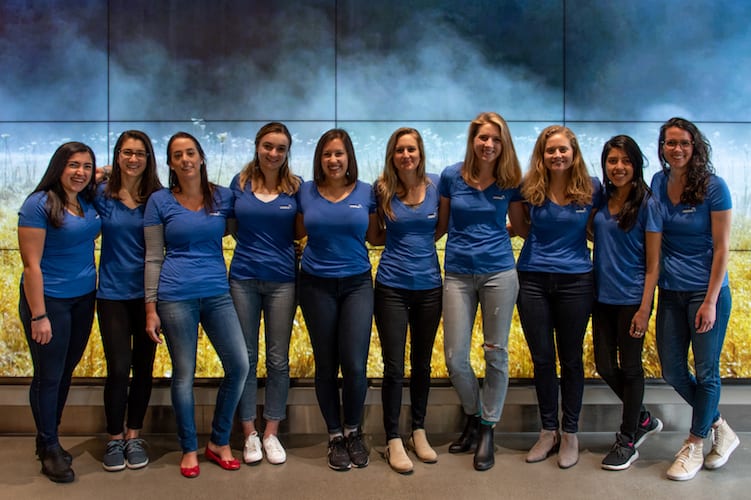
Members of the 2019 Women in Leadership Conference at the UC Berkeley Haas School of Business / Photo via http://newsroom.haas.berkeley.edu
Other speakers will be Sandra Lopez, VP at Intel Sports; Tyi McRay, interim director of diversity at Airbnb; Elena Gomez, CFO of Zendesk, and Brandi Pearce, lecturer in the Management of Organizations at Berkeley Haas.
Casale notes that the goal for the conference is to plant the seeds for change for those who attend.
“For us, it will be a win if attendees come away with a clear next step of what they can do to set themselves and their peers on a better path toward equity and inclusion … We want people to feel equipped for change and inspired to start it.”
Click here for more on this year’s conference.
How to Get an MBA
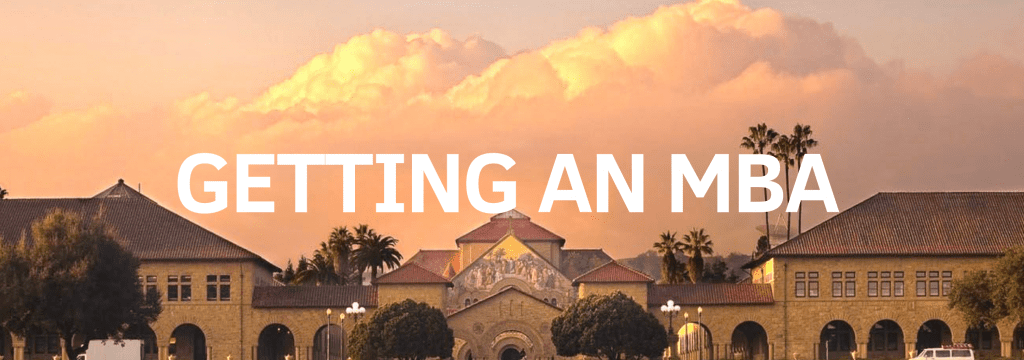
Are you thinking about pursuing an MBA or in the process of applying to graduate business schools? If so, MetroMBA has your back. As a prospective applicant thinking about getting an MBA, the process can seem daunting and overwhelming. However, we have provided key information on what you need to know about getting an MBA, the factors to consider, what types of MBA programs are offered and the general requirements for applying to business school. Below you will find the Ultimate Guide to Getting and MBA courtesy of our experts at MetroMBA:
What is an MBA?
A Master of Business Administration (MBA) is a graduate degree earned at a higher education institution that provides theoretical and practical training to help graduates gain a better understanding of general business management functions. According to our MetroMBA Database of over 150 schools, the core courses in an MBA program cover various areas of business such as accounting, applied statistics, business communication, business ethics, business law, finance, managerial economics, management, entrepreneurship, marketing, and operations in a manner most relevant to management analysis and strategy.
Is Getting an MBA Worth It?
You may be asking yourself, why should I get an MBA? You may be factoring in your current professional career trajectory and thinking whether that promotion will be yours without an MBA. You may also be thinking about ways to increase your salary in your current professional industry. Or you may be looking for a career change and believe that an MBA will open new opportunities for career advancement. All of these are great reasons to get an MBA and potential outcomes that getting an MBA will provide to you.
Program Formats:
This chart breaks down the four most common MBA program formats and includes a format description, typical age of students within each program, the typical length, average cost, who we recommend to take each program and the flexibility rating for completing the program.
| Category | Program Format | Typical Age Range of Student | Typical Length | Average Cost | Recommended For: | Flexibility Rating |
|---|---|---|---|---|---|---|
| Description | Describes how each MBA program is delivered to students. | The range varies significantly depending on the prestige of the institution. | The ability to balance work/life and your academic degree. The more check marks, the more flexible the program. |
|||
| Full-Time | Typicaly delivered on-site with live classroom sessions. These classes are held throughout the day and night depending on course schedule. | 25-34 | 12-24 months | $40,000-$150,000+ | - Young professionals who are looking for new career opportunities and/or career changers - Working professionals who can commit to a full-time academic workload and can be temporarily unemployed as they pursue their MBA | ✔ |
| Part-Time | Typically delivered on evenings or weekends in a hybrid format, which allows students to take classes both online and on-site. | 21-55+ | 24-48+ months | $40,000-$150,000+ | - Working professionals who cannot leave a full-time job commitment - Individuals with families or personal commitments | ✔✔✔✔ |
| Online | Most online MBA programs offer all learning fully online, however some programs require students to meet on-campus or at a remote location once throughout your degree. | 21-55+ | 16-48+ months | $10,000-$130,000+ | - Those seeking a flexible MBA to maximize work/life balance - Students who can excel in online learning environment | ✔✔✔✔✔ |
| Executive | Typically have on site sessions on the weekend once per month with other virtual requirements during the week. | 34-45 | 20-36 months | $45,000-$200,000+ | - Middle Management seeking career advancement - Career switchers - Working Professionals who are looking to refine their skills, knowledge and expertise | ✔✔✔ |
What are the Different Types of MBA programs?
Full-Time MBA:
Typically delivered on-site with live classroom sessions. These classes are held throughout the day and night depending on course schedule. The average age of a full-time MBA student is 25-34 and usually take between 12 months to 24 months to complete the program. One-year MBA programs are on the rise among universities due to the demand of MBA students seeking to complete their degree faster than the typical two-year MBA program, and are commonly found outside of the U.S. The average cost of a full-time MBA varies depending on the university prestige and can range from $40,000-$150,000. We recommend full-time MBA programs for:
- Young professionals who are looking for new career opportunities and/or career changers
- Working professionals who can commit to a full-time academic workload and can be temporarily unemployed as they pursue their MBA
Part-Time MBA:
Typically delivered on evenings or weekends in a hybrid format, which allows students to take classes both online and on-site. The average age ranges more than the full-time MBA program with the average student being between 25-55. It can take as short as 24 months to complete a part-time MBA while other programs can take as long as 48 months (or longer in some cases) depending on your flexibility. The average cost of a part-time MBA ranges from $40,000-150,000-plus. We recommend part-time MBA programs for:
- Working professionals who cannot leave a full-time job commitment.
- Individuals with families or personal commitments.
Online MBA:
Most online MBA programs offer all learning fully online, however some programs require students to meet on-campus or at a remote location once throughout your degree. The average age range is similar to a traditional part-time MBA program with the average student being between 25-55. Some online programs can be completed in a year, however the average range to complete and online MBA program is 16-48 months. Online MBA programs are typically the most affordable program format ranging from $10,000-130,000-plus. We recommend online MBA programs for:
- Those seeking a flexible MBA to maximize work/life balance
- Students who can excel in online learning environment
Executive MBA:
Typically have on site sessions on the weekend once per month with other virtual requirements during the week. The average student in an executive MBA program is between 35-44 and trends slightly older than other program formats since more than 7 years of work experience is required for most of these programs. The average time to complete an executive MBA program is 20-36 months and the average cost of an executive MBA is between $40,000-200,000-plus. We recommend online MBA programs for:
- Middle management seeking career advancement.
- Career switchers.
- Working professionals who are looking to refine their skills, knowledge and expertise.
- Small to medium-sized business owners.
How Long Does it Take to Get an MBA?
The average time it takes to get an MBA varies depending on the program you select. Full-time programs usually are the shortest in length, usually between 12 to 24 months, while part-time MBA programs can take from 12 months to over 48 months to complete. Online MBA’s can also be completed in as little as a year but typically take the average student between 16-48 months. Executive MBA programs are designed for working professionals in middle management, C-Suite executive and small to medium-sized business owners and take between 20-36 months to complete on average.
How Much Does it Cost to Get an MBA?
The cost of an MBA can range from as little as $10,000 USD to over $200,000; and that's just for tuition costs. This includes all program offerings including online, part-time, full-time and executive MBAs. See our MBA Program Chart below to view the average cost range of MBA programs associated with each format.
School v. School: UNC Kenan-Flagler vs. Duke Fuqua School of Business
The MBA application process is not for the faint of heart. Elite programs have increasingly required applicants to follow paths unique to their schools, which makes the process of narrowing down the options to find the right fit even more essential. Our School v. School series saves you the headache by offering a point-by-point comparison of two stand-out programs located in North Carolina’s Research Triangle: UNC’s Kenan-Flagler School of Business and Duke’s Fuqua School of Business. Read below to find out how the intense UNC vs Duke rivalry shakes down when it comes to business schools.
Top MBA Recruiters: Samsung
With Vision 2020 goals that include $400 billion in revenue via VR technology, the implementation of 5G, and biotech, Samsung is one of the most desirable companies for MBAs who want to advance their careers at the intersection of business and tech. Along with a strong recruitment record from top programs for interns, a potential Samsung career also offers recent MBA grads competitive starting pay.
Samsung Career and Internship Opportunities
Samsung’s Global Strategy Group (GSG) is comprised of 25 affiliates across a wide range of industries. In a recent talk with Harvard Business School, Jake Junghyun Suh, Senior Manager at Samsung GSG notes that the company “recruits the best talent from top business schools and develops them into high-caliber global general managers … [As an intern or a strategist], one learns essential management skills by working across diverse geographies, industries and functions.”
The company recruits first year MBAs as interns and second year students as Global Strategists via its Leadership Development Program (LDP), which has been active since 2016. The program seeks to place students into positions furthering the company’s goals and enriching the management pipeline. Adhering to the principle of “a company is its people,” Suh says, recruits are not just brought in and left to their own devices. Instead, they become ambassadors for GSG, connecting with managers across affiliated companies. Interns and second year strategists continue to be engaged at all levels as they advance through the LDP.
Interns begin the LDP with a two month placement at Samsung’s Seoul headquarters, before advancing into marketing or strategy roles as internal consultants. If they choose to advance, strategists then transfer to one of GSG’s subsidiaries or one of fifteen regional headquarters.
Three main categories of rotations make up the LDP: Product Marketing (12 months); Strategy & Operations (six months); and Sales and Marketing (six months).
Product Marketing
In product marketing, students see development of products through development to launch, and end-of-life cycle transition. In this rotation, interns are exposed to both customers and various stakeholders from the Seoul headquarters.
Strategy & Operations
During the strategy & operations rotation, interns engage in strategic planning and a wide variety of functional areas, gaining the opportunity to provide support toward driving company goals.
Sales and Marketing
During the six months of the sales and marketing rotation, interns can expect to consolidate market information to shape consumer profiles while interacting with ad agencies and working on brand development projects.
While the three rotations provide students with a framework within which to develop, each recruit is encouraged to explore projects based upon their own interests and expertise. Initiative is key to Samsung career success.
Roshan Vaidyanathan, Michigan State University MBA said in a contribution to Samsung’s recruiting website, “This program provides countless opportunities for valuable industry exposure, rapid professional development, and accelerated networking … You are given the platform to define your career.”
Samsung MBA Salary Expectations
Samsung career salaries, according to recent figures from Glassdoor, range widely based upon education and experience level. While a field sales manager with a BA can expect to start at around $50,000 per year and a $12,000 bonus, senior managers with MBAs earn upwards of $125,000 with $30,000 in bonuses.
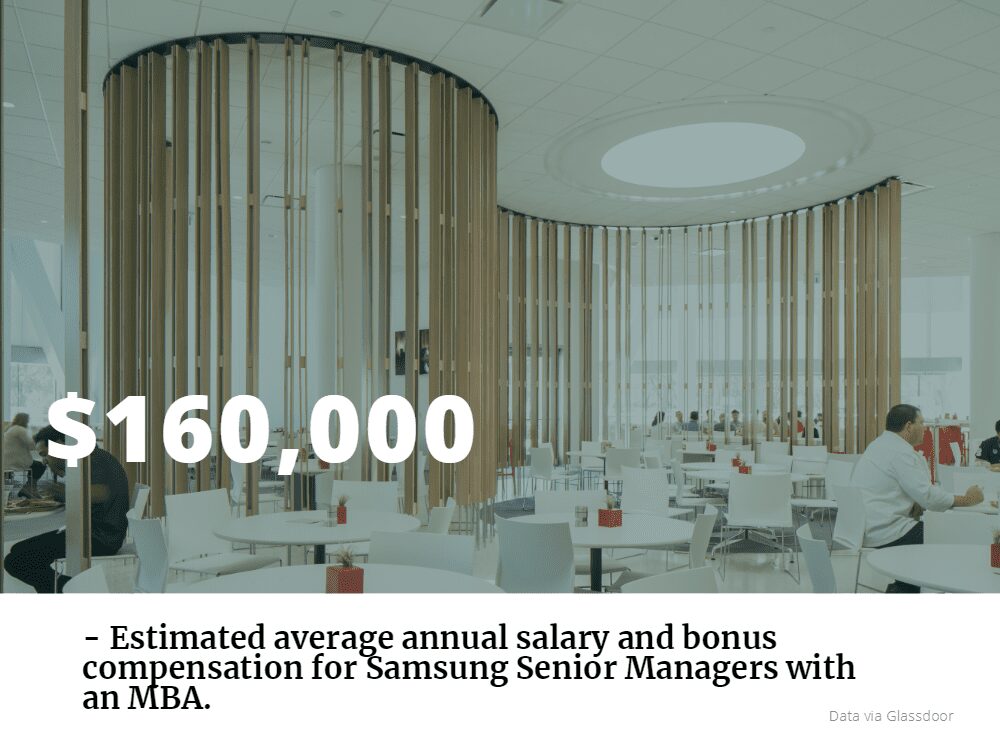
Recent openings include a Senior Strategy Management position within Samsung’s Accelerator, which supports the company’s startup efforts via innovative software and product development; a Product Marketing Manager job with Samsung’s TV division, and a Senior Manager for Integrated Marketing position. Each of these are located in Samsung’s Ridgefield Park, NJ headquarters.
MBAs willing to relocate may seek employment openings in the Seoul headquarters, or at one of the company’s locations in Silicon Valley, Seattle, Dallas, or New York City. The internship program also offers positions at each of these locations.
Some recent reviews by employees address Samsung’s company culture and benefit structure. Among these are that the company offers “an awesome environment [with] lots of freedom”… along with “exposure to new technologies and good benefits.” Samsung offers paid parental leave, along with competitive 401K matching and healthcare coverage that includes fitness memberships and wellness education.
Along with a strong community engagement/volunteer program, one of the other benefits of working at Samsung is its diverse environment. Employee Resource Groups (ERGs) for women, veterans, new mothers, and LGBTQ people offer networking and connection that help to enhance the employee’s experience at Samsung.
Wharton Takes Over Top Spot on New U.S. News MBA Ranking
Harvard loses its crown, Wharton ranks first, and Purdue stumbles in new U.S. News & World Report “Best Business Schools” ranking.
The annual U.S. News & World Report Best Business Schools ranking, largely regarded as the most prominent MBA ranking system in the United States, debuted its newest annual listing, with The University of Pennsylvania’s Wharton School taking the top mantle.
The Philadelphia metro business school ascends past Harvard Business School and the University of Chicago Booth School of Business—both tying for first last year. Both schools took a minor tumble to the third overall spot, sitting in a three-way tie with the MIT Sloan School of Management. Stanford’s Graduate School of Business lept into the second overall spot, which comes just a few months after the Silicon Valley school maintained its status as the best in the world according to the Financial Times.
U.S. News & World Report Top 10 Business Schools
| School | This Year's Ranking | Last Year's Ranking |
|---|---|---|
| Wharton (University of Pennsylvania) | 1 | 3 |
| Stanford Graduate School of Business | 2 | 4 |
| Harvard Business School | 3 (tie) | 1 (tie) |
| Booth (University of Chicago) | 3 (tie) | 1 (tie) |
| Sloan (Massachusetts Institute of Technology) | 3 (tie) | 5 |
| Columbia Business School | 6 (tie) | 9 |
| Kellogg (Northwestern University) | 6 (tie) | 6 |
| Haas (UC Berkeley) | 6 (tie) | 7 (tie) |
| Yale School of Management | 9 | 11 (tie) |
| Fuqua (Duke University) | 10 | 11 (tie) |
Within the top 50 business schools, this year’s ranking largely resembles last year’s. In fact, only three business schools—the University of Pittsburgh Joseph M. Katz Graduate School of Business, the Iowa State University Ivy College of Business, and the The Manderson Graduate School of Business at the University of Alabama—moved into the top 50 since last year. The three business schools to fall out of the top 50 were Rutgers Business School, the Haslam College of Business at The University of Tennessee, Knoxville, and the University of Utah David Eccles School of Business. All three moved down the ranking by at least 10 spots each.
U.S. News Ranking Rising Business Schools
No school saw a better year-end turnaround than the aforementioned Iowa State University Ivy College of Business. The Midwest business school moves from the 79th spot last year to 47th this year; a 32-spot increase. On the news of the new ranking, Dean David Spalding says in a press release, “This significant rise in the ranking is a direct result of the quality work our faculty do every day in the classroom. At a time when some universities are dropping their full-time MBA programs, the Ivy MBA continues to excel. Our internationally known faculty provide a top-notch MBA experience that helps our MBA graduates advance their careers to the next level.”

Iowa State University’s Ivy College of Business earns the biggest ranking bump from U.S. News this year, moving up 32 spots from last year.
Ten schools in the top 100 saw double-digit rankings jumps, with Iowa State accruing the greatest increase. The University of Kentucky Gatton College of Business and Economics, the Oklahoma State University Spears School of Business, and the Babson College F.W. Olin Graduate School of Business all saw a rise of at least 20 spots this year as well.
Purdue, Case Western Stumble
On the opposite end of this year’s ranking is Purdue University’s Krannert School of Management, falling a total of 21 spots from 53rd last year to 74th this year. The University of Kansas School of Business and the Saunders College of Business at RIT join Krannert as this year’s three biggest falling schools, each dropping at least 20 spots respectively. Like most of the annual U.S. News rankings, the placement fluctuation is much more apparent the further and further down the list you go, with schools in the top 50 largely remaining stable.
U.S. News 2020 Ranking Methodology
To formulate its ranking, U.S. News & World Report analyzed “475 MBA programs accredited by the Association to Advance Collegiate Schools of Business International.” A total of 367 schools responded to its surveys, but only 131 schools made the final ranking “because they provided enough of the required data on their full-time MBA program that were needed to calculate the full-time MBA rankings, based on a weighted average of the indicators.” Those indicators, with the weighted values, are as follows:
Quality Assessment (0.40)
• Peer assessment score (0.25)
• Recruiter assessment score (0.15)
Placement Success (0.35)
• Mean starting salary and bonus (0.14)
• Employment rates for full-time MBA program graduates
Student Selectivity (0.25)
• Mean GMAT and GRE scores (0.1625)
• Mean undergraduate GPA (0.075)
• Acceptance rate (0.0125)
Did The Methodology Changes Affect This Year’s U.S. News Ranking?
Last September, calls for changes in the MBA ranking methodology seemed to be answered by several large publications, including U.S. News. The company’s Chief Data Strategist, Robert Morse, noted, “There is an active and ongoing debate about how to best measure quality in education, and we pay close attention to that debate. Over time, our ranking model has put more emphasis on outcomes measures … As part of this evolving process, we’ve wanted to measure whether schools were successful at serving all of their students, regardless of economic status.”
The overarching issue seemed to lie within a framework that continually rewarded students and business schools that actively enrolled more and more students from affluent families. In response, U.S. News decreased its ranking value of acceptance rates, which previously rewarded schools that were more selective. Now, as seen above, the weighted value of acceptance rates is less than 1 percent.
However, the changes in the formula did not seem to bare much tenable change in the outcomes. The top 50 schools were largely unchanged, with only minor variances. Several schools, such as Iowa State and Oklahoma State were handsomely rewarded in the new ranking, moving up at least 20 spots each. However, schools rising and falling by 10, 20, even 30 spots in a given year isn’t a new occurrence. In fact, last year, nine schools in the top 100 rose at least 10 rankings from the previous year.
Stay tuned to MetroMBA for more information and analysis of this year’s MBA rankings.
5 Questions with the Director of Admissions at Illinois Gies College of Business
In our latest installment of the MetroMBA “5 Questions” series, we speak with Jennifer Larson, the University of Illinois Director of Recruiting and Admissions of Graduate Programs at the Gies College of Business. Larson talks about the future career of a Gies MBA grad, the hands-on nature of the MBA program, and the many financial aid opportunities for students.
1. What are Gies’ strongest industries and how does the school support students in those industries?
“Our recent graduates have worked for major corporations like Amazon, AT&T, Google, and Bank of America in a number of functional areas, including Consulting, Finance/Accounting, General Management, Information Technology, and Marketing.
Gies Business Career Services boasts a diverse employer base of Fortune 500 companies and other regional organizations across multiple industry sectors including, but not limited to, manufacturing, financial services, consumer products, and consulting. Almost 25 percent of the F500 and more than 40 percent of the F100 recruit from Gies College of Business.
Our students actively engage with global, national and regional employers on-campus and at major MBA consortium events. Illinois founded and participates with nine other Top 50 MBA programs in the Midwest MBA Career Fair, one of the largest regional MBA career fairs.
We offer alumni connections built through the Illinois Business Mentor Program and the Illinois MBA Alumni Association, bringing students and alumni together for an exchange of information on education, professionalism, aspirations, and ideas.
Our MBA students network and engage with alumni and employers for information sessions, workshops, networking events, career connections, and interview preparation. Illinois MBA alumni are counted among those who hold C-suite roles in manufacturing, consulting, financial services, and healthcare in both the public and private sectors.
We hear four predominant reasons why students pursue an MBA:
- to build and expand their professional network,
- to increase salary/earnings potential,
- to create greater future job optionality,
- to accelerate or change career paths.
Whatever the reason, Gies Business Career Services is an invaluable resource for our students from day one.
Career Services provides an integrated suite of career development, coaching, and alumni and employer resources that enable us to assist MBA students in achieving career success. This starts with pre-program groundwork.
Career Management Foundations is the eLearning portal to MBA Career Management in Gies College of Business. This launches your job search the summer before the MBA program commences. You will have the chance to engage in five distinctive career modules that expose you to career planning and active career management processes. These help our students define their goals and develop tools that will enable their professional advancement. Each module contains topic related information, videos, articles, assessments, and key deliverables.
We also provide customized career coaching and consultation for MBA students so they are fully prepared for the job search with a focus on building life-long job seeking skills that will help the student through each career transition. Combine that with being ranked #3 in ROI (BusinessWeek) and being a Top 25 U.S. Business School (Financial Times), there is no question that an MBA from Gies College of Business at Illinois delivers max value during and after your time in the MBA program.”
2. Can you identify the ideal Gies candidate? Characteristics you look for?
“At Illinois, we don’t look for students who want to sit in a classroom for two years. We admit students who are passionate about applying the concepts learned in the classroom, actively participate in and outside of the classroom, and are team oriented. We look beyond test scores. We value candidates who bring a strong sense of community, possess a good understanding of the importance of career outcomes, and can demonstrate excellent interpersonal and communication skills. We appreciate and welcome diverse personal and professional backgrounds beyond business.”
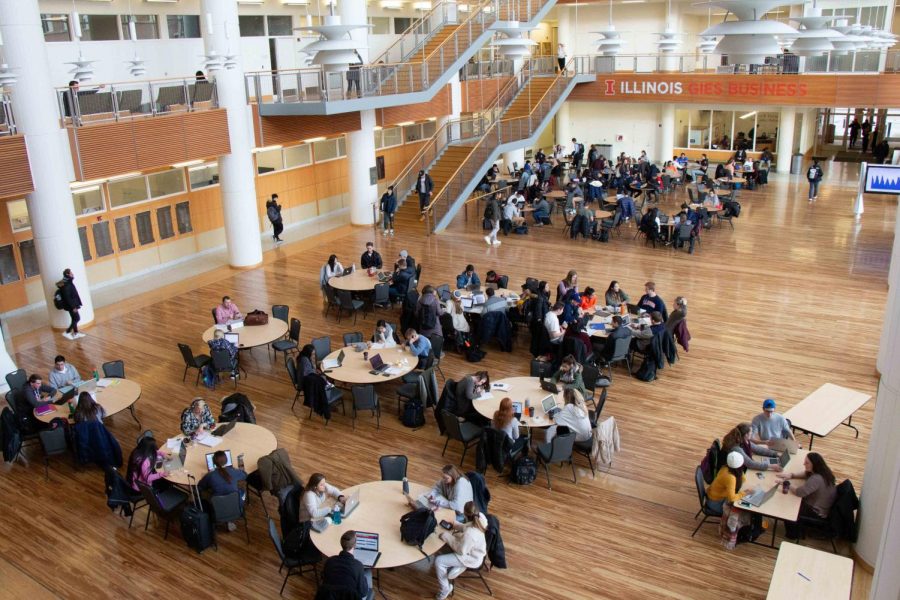
“, “At Illinois, we don’t look for students who want to sit in a classroom for two years. We admit students who are passionate about applying the concepts learned in the classroom, actively participate in and outside of the classroom, and are team oriented,” Larson says.
3. If there was one feature of the MBA program you could highlight, what would it be?
“The MBA program at Gies College of Business is one of the most hands-on MBA programs in the country.
Action Learning at Gies is more than a course or a program; it’s ingrained in our culture. Action Learning is integrated throughout our undergraduate and graduate programs. Because our students get hands-on experience during school, they graduate more prepared for the real-world, to add value from day one, and to succeed in their careers.
Action Learning projects are a critical part of the students’ education. We work with clients who invest in developing our students. When a client is engaged and committed, students reciprocate with enthusiasm and dedication to the project. Through our Action Learning programs, students have a better story to tell recruiters, improve their ability to work as a team, and enhance their ability to solve complex problems.”
4. What kinds of financial aid are available to MBA students?
“All candidates admitted to the MBA program in Gies College of Business at Illinois are automatically considered for our merit-based Dean’s Scholarships with no separate scholarship application necessary. 85 percent of students admitted to the MBA program receive a scholarship offer from our diverse portfolio of awards. We also want our students back! The Illinois x 2 Scholarship offers a 50 percent tuition reduction for full-time MBA students who are University of Illinois alumni and meet the eligibility requirements. Find all the scholarships here.
The MBA program at Gies is dedicated to training an inclusive cohort of future leaders in a diverse, global setting. In addition to our traditional merit-based scholarships, we allocate eight full-tuition scholarships annually, for graduates of historically black colleges and universities. Along with submitting a standard MBA application, applicants for these eight scholarships must have a competitive GMAT score (or equivalent GRE), at least two years of work experience, and a minimum GPA of 3.5.
Gies College of Business is committed to educating and directing talented women toward leadership roles in business. Gies College of Business is a Forté sponsor school dedicated to having a diverse group of Forté MBA Fellows, which is an honor given to select female MBA students at participating business schools. Both domestic and international women may be nominated as Fellows; each receives a generous scholarship from the MBA program at Gies College of Business.”
5. What underrated area/activity in Champaign – Urbana should every student do?
“Champaign-Urbana has a robust arts, culture, and music scene. Here, urban engages rural for an unparalleled ‘college-town’ experience that offers access to several renowned museums, and a thriving arts and culture community. In large part because of the University of Illinois’ diverse population, C-U has a strong foodie scene with a wide variety of restaurants and cuisines from all over the world. According to readers of Midwest Living magazine, the metro area of Champaign-Urbana is the best midwest food town.
For those interested in learning more about the full-time MBA program at Illinois Gies College of Business, head over to the school’s official website.
Top MBA Recruiters: Bridgewater Associates
Of the manifold of competing hedge funds, one clearly stands out above the rest: Bridgewater Associates.
With over $150 billion in assets under management, the Westport, Connecticut, firm is highly-regarded for its ability to consistently make gains—even during the 2008 economic crisis. In 2018, the firm’s flagship Pure Alpha fund gained 14.6 percent.
Let’s take a closer look at why MBA graduates should consider a Bridgewater Associates career.
Why MBAs Love Working at Bridgewater
Given its position in the market, Bridgewater provides a generous starting salary. According to Glassdoor, Management Associates—a position which MBAs would start their careers—are paid an average of $120,199 per year.
As with most investment jobs, bonuses from a successful year can raise this total even higher. This base rate puts Bridgewater well ahead of many of its peers in terms of compensation.

In addition to the starting salary, many MBAs are drawn to Ray Dalio, Bridgewater’s idiosyncratic leader. Dalio runs Bridgewater according to a series of principles that he developed early in the firm’s life that all employees are expected to follow.
Life at Bridgewater
Bridgewater’s culture is rooted in two major policies: radical truth and radical transparency.
Unlike other hedge funds, there is a flat hierarchy at Bridgewater. No one person is above criticism, meaning that anyone can criticize anyone else if they have done something incorrect. Since the company thrives on openness, employees’ ideas are often challenged by others to ensure that they are the best possible ones. Every person at Bridgewater is held accountable; all communication and meetings are recorded and made available to anyone who cares to access them.
While some find this environment to be too intense, many thrive in it. The openness of the company has created a tight-knit community that supports and takes care of one another. In terms of perks, the company offers employees free breakfast, lunch, and dinner; on-site meditation rooms, gyms, and laundry facilities; and shuttle service for those commuting from New York City or north.
Bridgewater Associates Career Prospects
Given that Bridgewater is extremely tight-lipped to the public about many aspects of its business, it is unclear where they recruit people and how many people they pull from particular locations. It can be said that they do engage in on-campus recruiting. When interviewing a managerial candidate, Bridgewater looks for “intellectually curious people” who value “truth, openness, and the pursuit of excellence at all costs.”
Candidates undergo the Bridgewater interview process. Often described as weird, the process involves many different interviews and tests to assess a candidate’s skills, as well as his/her potential fit with the organization. This can be a grueling process that wears down less interested candidates.
As noted earlier, the most important aspect is whether a candidate fits into the Bridgewater culture. To this end, anyone who is considering applying to work at Bridgewater must read Dalio’s Principles. This will let potential applicants know if Bridgewater is for them and give them a leg up during the interview process.
Friday News Roundup – Rutgers Accounting Partnership Announced, and More
Let’s take a look at some of the biggest stories from this week, including Rutgers accounting expanding.
Rutgers To Offer Accounting Students International Exposure – Rutgers Business School News
Rutgers Business School has partnered with the Chartered Institute of Public Finance and Accountancy (CIPFA) to give certified students the ability to offer public finance services in countries outside the U.S.
The memo of understanding between Rutgers and CIPFA states that current students and graduates of the Masters in Governmental Accounting Program can qualify to practice internationally after completing the online certification course, which will begin in September 2019.
Among the advantages of the CFA designation are access to networking opportunities, seminars, and ongoing professional development throughout one’s career—in addition to the ability to practice internationally. Rob Whiteman, Chief Executive Officer of CIPFA, says of the agreement. “CIPFA is delighted to be entering into a partnership with Rutgers University that will allow us to share our expertise and explore common goals to the benefit, not only of the students, but the public sector globally, which can only gain through greater cooperation among government accountants … [the] memorandum of understanding will enable the development and retention of top talent for government accounting.”
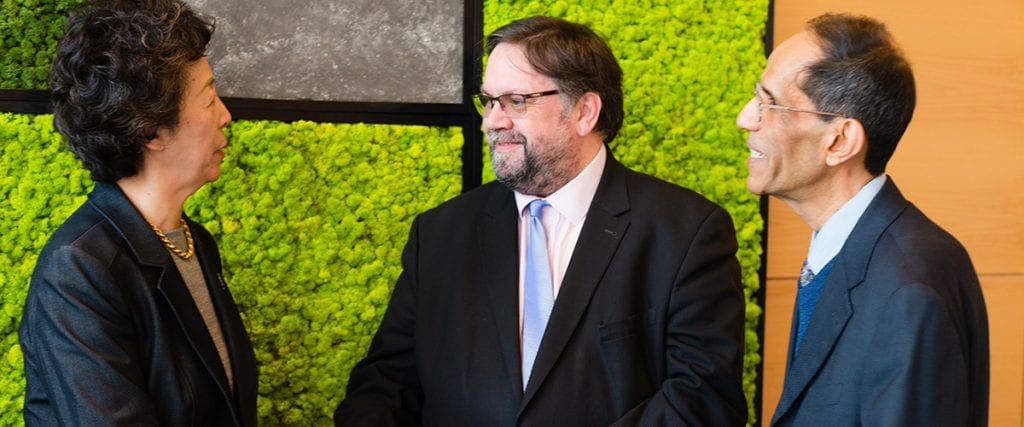
CIPFA CEO Rob Whiteman (center), alongside Dean Lei Lei (left) and Professor Irfan Bora at the Feb. 27 signing. / Photo via business.rutgers.edu
Click here for more about the CIPFA and Masters in Governmental Accounting program.
LeBow Hosts Webinar for Customizable MBA and More – Lebow News
On March 12, 2019 from 12-1 p.m., Drexel University’s LeBow College of Business will host a webinar for those interested in its customizable MBA. Information will also be available on all other postgraduate business education.
The session is open to all current and future students, and to full time, part time and international students.
Attendees will be able to connect one-on-one with admissions staff during the webinar, which will cover the following: full-time MBA; part-time MBA on the Philadelphia campus and in Malvern; the Online MBA; and the Masters programs in Accounting, Business Analytics, Economics, Supply Chain Management and Logistics, Marketing, and Quantitative Finance.
To register for the webinar, click here.
Goizueta Panelists on the State of Healthcare in 2040 – Goizueta Business School Insights
Emory University’s Goizueta Business School recently hosted a panel of senior managers from multiple healthcare sectors who made predictions on the future of the industry for both providers and consumers. Moderated by Associate Professor in the Practice of Organization and Management Renee Dye, the panel’s discussion focused specifically on the state of healthcare in the year 2040.
Panelists Jeff Fusile, President of Blue Cross and Blue Shield of Georgia; Judith Monroe, President and CEO of the CDC Foundation; Dane C. Peterson, Chief Operating Officer of Emory Healthcare; and Mike Van Den Eynde, Managing Director of Deloitte Strategy and Operations at Deloitte all contributed their insights at the February event.
Jeff Fusile commented on the rising cost of insurance:
“More than half of a family’s gross income goes to cover the average family of four’s healthcare cost—not a sick family, not a healthy family, the average family … “If we don’t make a change, 10 years from now, maybe 20 years from now, we’ll be here saying, ‘Now it costs 100 percent of your gross income.’”
Monroe’s remarks pointed out the complex factors involved in the growth of healthcare:
“The future really will depend on a complex web of things, all the way from science, technology and data to economics, political factors, social factors and certainly environmental factors … By 2040, we’re going to have new devices that we can’t imagine today. When you wake up, you’re going to have real-time blood pressure, biometrics and blood chemistries.”
Each panelist pointed out the vast changes that healthcare tech will undergo, along with the shift that will be necessary in order for the healthcare business to become consumer focus as opposed to profit driven.
Check out more from the recent panel here.
Loyola’s Sellinger School Announces New Classes in Downtown Baltimore – Loyola News
Loyola University Maryland’s Sellinger School of Business has announced that it will offer classes for its new Professional’s MBA hybrid cohort in Downtown Baltimore.
The Center Club at the Transamerica Building will be home to the cohort, which meets in conference rooms on Mondays from 6:30-9 p.m. The Professional’s MBA (PMBA) is offered as a part-time degree for professionals from all backgrounds, and it is designed so that students may pursue the degree at their own pace.

The Transamerica Building, the tallest in Baltimore, will host classes for the Sellinger School of Business Professional’s MBA hybrid cohort.
“We are delighted to open a downtown location that will bring our excellent business courses we offer into the heart of Baltimore …So many professionals live and work [here], and Loyola wants to meet them where they are,” says Sellinger Dean Kathleen A. Getz, Ph.D.
PMBA students, who will take 33-42 credits, will complete the remainder of the coursework online, but the Center Club will be the cohort’s hub for meeting and learning. For registration info and more on the PMBA click here.
Mendoza College of Business’ New “Interterm” Gives Real World Experience – Mendoza News
University of Notre Dame’s Mendoza College of Business now offers a unique course in which students can flex real world skills while earning credits and providing community service.
The “Interterm” is offered in the first week of March, and it is meant to promote engagement with organizational partners to complete a selection of projects that will benefit the company, the student, and the surrounding community. Thirty-four partners from across the country signed on for Interterm. Among them was HUNGRY, a catering company in Washington, D.C.; Waves for Water, which helped distribute filtration kits to those affected by Hurricane Maria, and the Catholic Volunteer Network, which will partner students with young people in Takoma Park, MD.
After an extensive survey process with Mendoza’s MBAs, the program was revamped from classroom case-studies to the experiential learning model that it used this year. Alice Obermiller, Associate Director for Experiential Learning in Graduate Business Programs says of the new curriculum, “[Students] wanted to engage in activities that tangibly built up their resume with demonstrated experiences working on real and timely issues … like most of us, [students] have many competing priorities, so they want to engage in things purposefully and that serve them most at the time.”
In addition to the Interterm projects, students will be able to take part in international immersion programs in China, South America, and South Africa. For more on Interterm and the immersion programs, click here.
Michigan Ross’ Associate Admissions Director Answers 5 Questions
In our latest installment of the MetroMBA “5 Questions” series, we speak with Anne Schoen, the Associate Admissions Director of Part-Time MBA Programs at the University of Michigan Ross School of Business. Schoen talks about the newest Ross MBA program, changing the Online MBA game, and what this means for the future of business schools.
1. Why do you believe the Ross School of Business elected to start offering an online MBA now?
“More and more companies are operating on a global scale, and professionals need to be able to effectively interact with and manage teams across those global boundaries. Managing a project with team members in four different locations presents a different challenge than if those team members all work in the same building. We see educational value in preparing our students to work and engage through primarily virtual channels. Professionals who possess this unique skill set can differentiate themselves in the career marketplace.
In addition, technology (connectivity, learning platforms, virtual tools, etc.) today is at a place where we feel comfortable that an online experience can rival what we offer in our on-campus programs.
Finally, we are answering a demand in the market. For years, we have heard prospective students tell us they really wanted a top-tier MBA experience but require more flexibility in course scheduling and graduation pace. There are amazing working professionals out there desiring a premier educational experience whom this program can serve.”
2. What do you believe are the integral differences between this online program and others currently available at other schools?
“One of the signature features of a Michigan Ross MBA is an emphasis on action-based learning, and our Part-Time MBA: Online is no exception. Our three required on-campus residential experiences and required Multidisciplinary Action Project (MAP) course set us apart from other online programs. Our students will enjoy the flexibility of an online program, but also will benefit from engaging in-person with faculty and fellow students during these fully immersive experiential learning projects. These experiences will require that students take the theories they learn in class and apply them to real-world business scenarios. We also will offer our online students full access to our Career Development Office resources, including assistance with on-campus and off-campus recruiting, and individualized career development planning.”
3. What do you believe other online programs may be missing?
“We have been very intentional in the development of the online MBA program to ensure that students in this program have the same access and a similar experience to those students enrolled in our on-campus MBA programs. We are holding applicants to the same rigorous admissions standards, keeping the class size fairly small, providing them with the resources needed to advance their careers or make a career switch, giving them a connection to campus and the vast Ross network through residencies, and offering lifelong learning opportunities through our AlumniAdvantage program.”

The all-new Part-Time MBA: Online at the University of Michigan Ross School of Business offers students a flexible, online schedule, coupled with the business school’s hands-on curriculum approach, featuring on-campus residencies and the Multidisciplinary Action Project (MAP) course.
4. If someone couldn’t decide between Ross’ part-time online MBA and the other options at the school, what factors do you think should push them to the online program?
“I think the two major factors students should consider when choosing between program options at Ross are geography and flexibility. Our Part-Time MBA: Evening program, while flexible in nature, is really only an option for people living in the region because class meetings take place primarily on weeknights. Our Part-Time MBA: Weekend program attracts student from across the country looking for a lockstep, cohort-based program. The Part-Time MBA: Online is flexible—students’ progress at their own pace—while also being open to people across the U.S. I always tell students to select the MBA program based on what format is going to work best for their own busy working-professional and personal schedules. The great thing is that we have many MBA formats that feature the same rigorous Ross curriculum. Regardless of schedule, one of our program options will likely meet your needs.”
5. Is this a sign for more online programs to come for the Ross School of Business?
“That is an excellent question. Here at Ross, we are always looking at new ways to innovate our programs and ensure that our elite learners have an exceptional educational experience. We will continue to evaluate the changing MBA landscape and needs in higher education and our offerings. Today, we are focusing our energy and resources on successfully launching the Part Time MBA: Online program and recruiting our first class of students.”
For those interested in learning more about the Ross Part-Time: Online program, head over to the school’s official website.
Top Deferred Enrollment MBA Programs Geared Toward Younger Candidates
Most of the time, full-time MBA programs require work experience and, overall, class averages of professional experience are close to five years. Rarely are programs open to younger candidates who are still pursuing their undergraduate degrees. However, that all changes when it comes to deferred enrollment programs.
These programs guarantee senior undergraduate students a spot at some of the top MBA programs in the world, two to five years after they graduate. This means that you graduate with a plan for the future and the time to figure out the details.
Recently, MIT Sloan announced a new deferred enrollment program, joining the ranks of other top b-schools including Chicago Booth, Columbia Business School, Harvard Business School, Stanford GSB, UVA Darden, The Wharton School, and Yale School of Management. Each of these programs is set up similarly and vies for top talent at undergraduate schools around the world.
How Deferred Enrollment Programs Work
“This type of program is for those who know that an MBA program is something they want to pursue, in the future. Not directly after their undergraduate degree (in most cases), but a couple of years later,” explains Alex Brown, an MBA admissions expert at Clear Admit.
Ambitious undergraduate students apply to b-school during their senior year and then receive a promise of a seat in a future cohort. Typically, students gain two to five years of work experience between acceptance and starting the MBA. Then, after their deferral, they join the same MBA cohort as the traditional full-time MBA.
“By applying and gaining admission, it helps reduce the uncertainty of their plan, going forward. So rather than entering an analyst program at a consulting firm, for example, with the hope of gaining admissions to a top MBA program after a few years, they can enter the analyst program knowing they have an MBA option already,” Brown says. “Of course, it doesn’t stop them from changing their mind, or pursuing other MBA options, and forgoing the early admission.”
These deferred enrollment programs are ideal for future leaders. Typically candidates have outstanding internships, strong academic credentials, and high test scores when they apply. “Also, these candidates are still typically early in their career arch when they do attend their MBA program. But, it makes sense if they are focused and really understand how the MBA program will help develop their career further,” explains Brown. “It’s good for candidates with focused career goals.”
Additionally, it’s important to note that deferred admissions MBA programs are designed to attract different types of students. They want candidates who might not typically have business school on their radar, but come from a STEM or humanities background. The key for applicants is to have a solid plan for the future and knowledge of how the MBA fits into that plan.
So, what are some of the top deferred enrollment programs and how are they unique?
Deferred Enrollment at a Glance
At a glance, most of the top b-schools offer very similar MBA programs geared toward younger candidates. All but Yale SOM are two years in length and place students in the same cohort as the full-time MBA. On the other hand, the Yale Silver Scholars program is three years in length with the first and third year being the same as the standard MBA and the second year in an extended internship. The reason behind this difference is that the program accepts candidates directly after their undergraduate career without any work experience.

The Yale Silver Scholars is one of the many MBA deferment programs offered at some of the best business schools in the world.
The rest of the programs encourage students to take two to five years off to gain work experience before they start their MBA. However, in some cases, work experience is not necessary if acceptance is during their final year (fifth year) of graduate school, such as is the case for Stanford’s deferral program.
“Generally, the students co-exist in the same program,” explains Brown. “Younger students might have more energy and enthusiasm, older candidates might have more experience and insights. It can become a great blend for an academic experience.”
Other stand-out differences include the fact that the Wharton Moelis program is only for University of Pennsylvania students. Sloan allows MIT students with an undergraduate GPA of 4.25 to avoid the GMAT, and Darden and Wharton both include scholarships for their deferred programs.
Finally, you can expect to apply to each of these programs in April, around the Round Three MBA application deadline, though Darden uniquely offers three application deadlines.
Inside the Top B-Schools with MBAs Geared Toward Younger Candidates
The differences between the programs lie in the characteristics and incentives offered by each. Here’s a deeper look at some of the top offers, who can apply, and how it works.
• Chicago Booth Scholars Program
The Chicago Booth Scholars program is for candidates with three or fewer years of full-time post-undergraduate work experience. It’s open to undergraduates from any institution in their senior year, granting applicants a two to four-year deferment before starting the MBA program. While working full time, students have the opportunity to engage with Booth, explore the community, travel, and whatever else is of interest. Applications are due in April and are similar to the full-time MBA application.
• Columbia Business School Deferred Enrollment Program
The Columbia Business School Deferred Enrollment program is open to undergraduate and graduate students who apply during their final year of schooling. Once accepted, you can take two to five years to enter the workforce and start the full-time MBA program when it’s right for you. Applications are similar to the full-time MBA program with slightly different short answer questions and are due in April. Once you decide to matriculate, you join the full-time MBA program.
• Harvard Business School 2+2 Program
Harvard’s 2+2 program is the best-known deferred MBA of its kind. Candidates apply in their final year of undergraduate or graduate school, then spend a minimum of two years (maximum of four) working full-time before they begin their full-time, two-year MBA program. This program is specifically for students working in the public, private, or nonprofit sector with an emphasis on STEM and humanities disciplines. The application is essentially the same online application for the MBA program; the application fee is simply lower. The admissions deadline is in April. Candidates enter the full-time MBA program once they have met work experience requirements.
• MIT Sloan MBA Early Admission
The MIT Sloan MBA Early Admission program is open to any exceptional undergraduate student. However, MIT students can avoid the GMAT with a GPA above 4.25. You can apply your senior year or directly after graduation in either your undergraduate or graduate academic career. Applications are due in April, and between acceptance and starting the program, candidates may seek two to five years of full-time work experience. Once matriculating, students enter the same MBA full-time program.
• Stanford GSB Deferred Enrollment
The Stanford GSB Deferred Enrollment program is open to undergraduate students who want to begin their MBA immediately after their senior year. However, students can defer for one to three years to gain work experience. You can apply during any of GSB’s three application rounds and can choose which year’s MBA program you’d like to enter. If you decide to defer for one to two years, you can apply for specific fellowships the year before starting your full-time MBA.
• UVA Darden FYSP
The UVA Darden FYSP program is open to undergraduate students in their final year and fifth-year master’s students. Candidates can apply in March, May, and August, and once admitted begin their professional journey. They ear two to four years of work experience and gain access to the Darden alumni community for mentorship, networking, and individualized career support. Then, once ready, candidates join the regular full-time MBA program with a guaranteed scholarship in hand.
• Wharton Moelis Advance Access Program
The Wharton Moelis program is a feeder program only for University of Pennsylvania undergrads. Students accepted into the program receive special professional development, career services, and access to the Wharton community such as annual retreats, mentoring, and a potential $10,000 a year fellowship. You apply senior year during Round 3 MBA admissions, and with evaluation similar to the overall MBA pool. You defer for two to four years of work experience and then join the regular two-year, full-time MBA program when you’re ready.
• Yale SOM Silver Scholars
The Yale Silver Scholars program was initially created just for Yale undergrads, but now recruits from an international talent pool. The difference with this program is that students start their MBA immediately after college graduation. You spend one year taking core curriculum before your full-time extended internship in year two. Then, your third year, you return to Yale SOM to complete your degree. Students integrate into the Yale SOM MBA, but have special programming and career development tailored to them. Candidates apply their senior year and fill out the same full-time MBA application.
This article has been edited and republished with permissions from its original source, Clear Admit.











